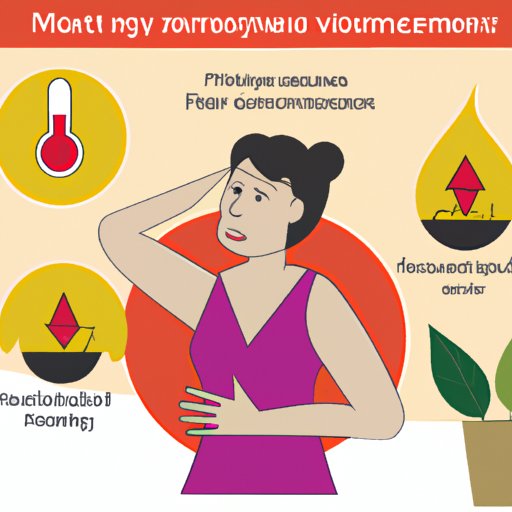
I. Introduction
Vasomotor symptoms are a common experience for women going through menopause. These symptoms are often a source of discomfort and can affect daily life, but they are also an important issue to address. Understanding what vasomotor symptoms are and how to manage them can greatly improve a woman’s quality of life during menopause.
II. Understanding Vasomotor Symptoms: The What, Why and How
Vasomotor symptoms are a group of physical symptoms that occur due to changes in blood vessel function. The most common vasomotor symptoms are hot flashes and night sweats, which are often accompanied by a rapid heartbeat, flushing, and a feeling of heat throughout the body. Menopause is the main cause of vasomotor symptoms, but they can also be caused by other factors such as stress and certain medications.
Vasomotor symptoms occur when the body’s internal thermostat, the hypothalamus, becomes more sensitive to changes in temperature. This can lead to a hot flash or night sweat, which is the body’s way of attempting to cool down. While vasomotor symptoms are not life-threatening, they can be a source of discomfort and can impact daily life.
III. Hot Flashes, Night Sweats, and More: Navigating Vasomotor Symptoms
Vasomotor symptoms can be experienced in different ways. Hot flashes are the most common vasomotor symptom, characterized by a sudden feeling of heat in the upper body and face. Night sweats are similar but occur during sleep and can cause excessive sweating and discomfort. Other vasomotor symptoms include chills, palpitations, and dizziness.
It’s important to track vasomotor symptoms in order to better understand when they occur and what triggers them. This can also help when seeking medical treatment or natural remedies for symptom relief. Vasomotor symptoms can affect daily life by causing sleep disturbances, irritability, and difficulty concentrating.
IV. Coping with Vasomotor Symptoms: Tips and Tricks
There are several ways to manage vasomotor symptoms. Lifestyle changes such as wearing breathable clothing, avoiding spicy foods and alcohol, and regular exercise can help alleviate symptoms. Medical treatments such as hormone replacement therapy (HRT) and selective serotonin reuptake inhibitors (SSRIs) can also be effective in reducing symptoms.
Psychological techniques such as deep breathing, mindfulness, and cognitive-behavioral therapy have also been shown to help manage vasomotor symptoms. These techniques can help reduce stress and anxiety, which can exacerbate symptoms.
V. The Connection between Vasomotor Symptoms and Menopause
Vasomotor symptoms are most commonly associated with menopause, and the frequency and severity of symptoms can be influenced by hormonal changes. As women go through menopause, their estrogen levels decrease, which can trigger hot flashes and night sweats. Hormonal fluctuations during perimenopause, the transition period before menopause, can also cause vasomotor symptoms.
VI. Exploring Natural Remedies for Vasomotor Symptoms: A Comprehensive Guide
There are a variety of natural remedies that can help manage vasomotor symptoms. These include herbal supplements such as black cohosh and soy, acupuncture, and yoga. While natural remedies can be effective, it is important to consult with a healthcare provider before trying any new treatments.
It’s also important to note that natural remedies may not work for everyone and may not be effective for severe symptoms. It’s important to weigh the pros and cons of natural remedies and discuss with a healthcare provider what may work best for individual women.
VII. Conclusion
Vasomotor symptoms are a common experience for women going through menopause. While they can be a source of discomfort, there are many ways to manage and alleviate these symptoms. Women should not hesitate to seek help and support for vasomotor symptoms and speak with a healthcare provider about the best course of treatment for their individual needs.




